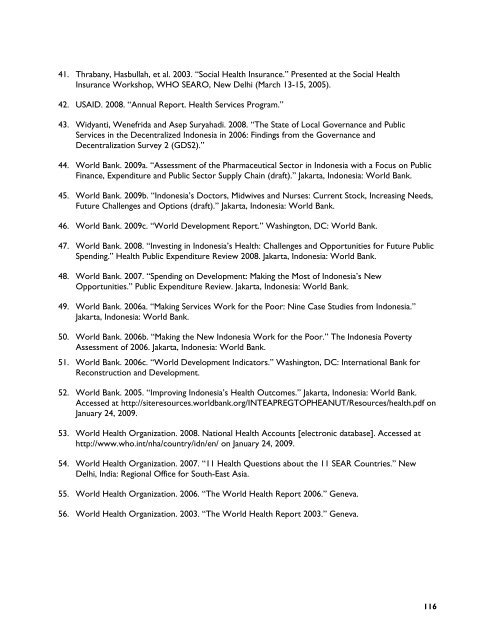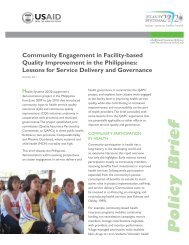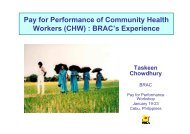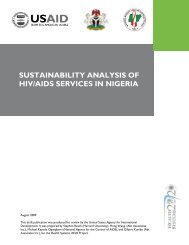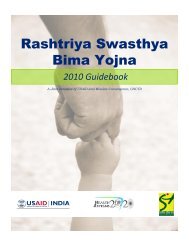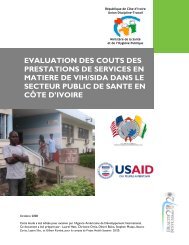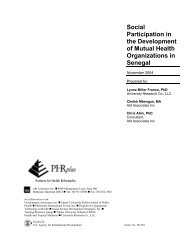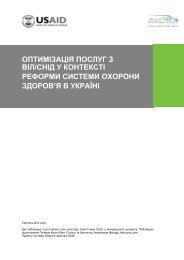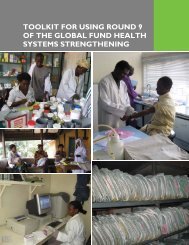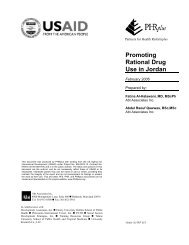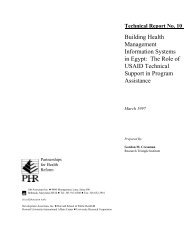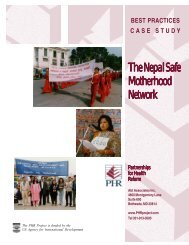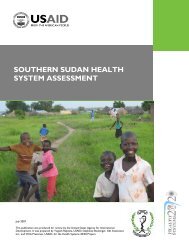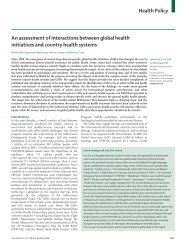PRIVATE SECTOR HEALTH CARE IN INDONESIA - Health Systems ...
PRIVATE SECTOR HEALTH CARE IN INDONESIA - Health Systems ...
PRIVATE SECTOR HEALTH CARE IN INDONESIA - Health Systems ...
- No tags were found...
You also want an ePaper? Increase the reach of your titles
YUMPU automatically turns print PDFs into web optimized ePapers that Google loves.
41. Thrabany, Hasbullah, et al. 2003. “Social <strong>Health</strong> Insurance.” Presented at the Social <strong>Health</strong>Insurance Workshop, WHO SEARO, New Delhi (March 13-15, 2005).42. USAID. 2008. “Annual Report. <strong>Health</strong> Services Program.”43. Widyanti, Wenefrida and Asep Suryahadi. 2008. “The State of Local Governance and PublicServices in the Decentralized Indonesia in 2006: Findings from the Governance andDecentralization Survey 2 (GDS2).”44. World Bank. 2009a. “Assessment of the Pharmaceutical Sector in Indonesia with a Focus on PublicFinance, Expenditure and Public Sector Supply Chain (draft).” Jakarta, Indonesia: World Bank.45. World Bank. 2009b. “Indonesia’s Doctors, Midwives and Nurses: Current Stock, Increasing Needs,Future Challenges and Options (draft).” Jakarta, Indonesia: World Bank.46. World Bank. 2009c. “World Development Report.” Washington, DC: World Bank.47. World Bank. 2008. “Investing in Indonesia’s <strong>Health</strong>: Challenges and Opportunities for Future PublicSpending.” <strong>Health</strong> Public Expenditure Review 2008. Jakarta, Indonesia: World Bank.48. World Bank. 2007. “Spending on Development: Making the Most of Indonesia’s NewOpportunities.” Public Expenditure Review. Jakarta, Indonesia: World Bank.49. World Bank. 2006a. “Making Services Work for the Poor: Nine Case Studies from Indonesia.”Jakarta, Indonesia: World Bank.50. World Bank. 2006b. “Making the New Indonesia Work for the Poor.” The Indonesia PovertyAssessment of 2006. Jakarta, Indonesia: World Bank.51. World Bank. 2006c. “World Development Indicators.” Washington, DC: International Bank forReconstruction and Development.52. World Bank. 2005. “Improving Indonesia’s <strong>Health</strong> Outcomes.” Jakarta, Indonesia: World Bank.Accessed at http://siteresources.worldbank.org/<strong>IN</strong>TEAPREGTOPHEANUT/Resources/health.pdf onJanuary 24, 2009.53. World <strong>Health</strong> Organization. 2008. National <strong>Health</strong> Accounts [electronic database]. Accessed athttp://www.who.int/nha/country/idn/en/ on January 24, 2009.54. World <strong>Health</strong> Organization. 2007. “11 <strong>Health</strong> Questions about the 11 SEAR Countries.” NewDelhi, India: Regional Office for South-East Asia.55. World <strong>Health</strong> Organization. 2006. “The World <strong>Health</strong> Report 2006.” Geneva.56. World <strong>Health</strong> Organization. 2003. “The World <strong>Health</strong> Report 2003.” Geneva.116


